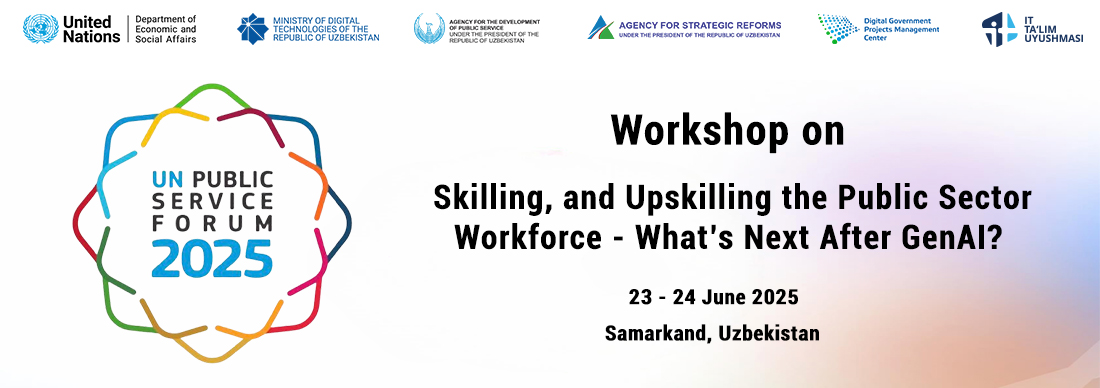CAPACITY DEVELOPMENT
2025 UNPSF Workshop 4: Skilling, and Upskilling the Public Sector Workforce- What’s Next After GenAI? (23 - 25 June 2025)
May 27, 2025

Organised by
United Nations Department of Economic and Social Affairs (UN DESA), through
its Project Office – United Nations Project office on Governance (UNPOG) of the Division for Public Institutions and Digital Government (DPIDG)
The UN Public Service Forum 2025 will take place in Samarkand, the Republic of Uzbekistan, from 23 to 25 June 2025, under the theme “Five Years to 2030: Accelerating Public Service Delivery for a Sustainable Future”.
The Forum will be comprised of a series of workshops where various elements related to the overall theme will be explored in more detail. This workshop will explore the evolving impact of artificial intelligence on the public sector, focusing on strategies to bridge the skills gap, strengthen digital and data literacy, and equip public sector employees with the competencies needed to harness emerging technologies such as generative AI and agentic AI for effective and responsible governance.
Background
The rapid advancement of artificial intelligence (AI) technologies, including both traditional and generative AI (GenAI), has created unprecedented opportunities for public sector innovation and transformation. As highlighted in the UN Global Digital Compact, digital technologies are fundamentally reshaping how governments deliver services, engage with citizens, and address complex societal challenges. The adoption of the Pact for the Future at the UN Summit of the Future on September 22, 2024, further underscores the international community's commitment to harnessing digital technologies to advance sustainable development, peace, and security.
However, the integration of AI technologies into public administration has also widened the skills gap faced by many public sector workforces. The evolving AI landscape raises challenges for the future of work, including in the public sector, such as increasing skills gaps and job displacement.1 This necessitates proactive measures, including workforce retraining, to mitigate the risk of deepening digital disparities. The rapid pace of technological change, particularly in the field of AI, calls for a proactive and coordinated approach to workforce development.
As governments transition from exploring GenAI applications to preparing for the next wave of AI innovation—particularly agentic AI systems that can autonomously execute complex tasks—there is an urgent need to invest in targeted skilling and upskilling initiatives. To build strong institutions, the public sector entities must invest in targeted skilling and upskilling initiatives to ensure effective and efficient service delivery. These efforts are not only essential to align with the aspirations of the Pact for the Future and its Global Digital Compact but also to build strong public institutions capable of effectively and efficiently delivering service.
Objective
This workshop aims to equip the public sector workforce with the knowledge, skills, and practical tools needed to navigate and lead in the era of AI transformation, while also exploring what comes next. Participants will examine how to identify and address evolving skills gaps, strengthen digital and data literacy, and understand the transformative potential of emerging technologies such as generative AI and agentic AI. Through forward-looking discussions, the workshop will support the development of an AI-ready public workforce capable of leveraging frontier technologies to enhance public service delivery and advance the Sustainable Development Goals.
Registration: By invitation only.
Note: For more information on 2025 UN Public Service Forum, visit the 2025 UN Public Service Forum website here.
Document(s)
Presentation Material(s)
Session I – Next-Generation Public Servants: Building Skills for Future Government Delivery
- Mr. David Fulford, Chief Executive Officer, Director General, The Institute of Public Administration of Canada (IPAC), Canada
- Ms. Anita Palcich, Senior Manager Advisory Services, KPMG Canada, Leader Skills Development Centre – KPMG x Microsoft
Session II – Digital and Data Literacy for Public Sector Excellence
- Ms. Piret Tõnurist, Innovation Lead, Doctorate for Public Governance, Organisation for Economic Co-operation and Development (OECD)
- Mr. Jayarethanam Pilla, Global Practice Professor, UN Futures AI Consultant, Chief Artificial Intelligence Office (CAIO), Blue Silicon Info Tech
- Mr. Hyun Joon Kim, Professor of the Department of Public Adminstration, Korea University
Session III – Generative AI in Government: The Next Frontier of Public Services
- Mr. Ng Shangru, Senior AI Engineer, Government Technology Agency, Singapore
- Mr. Woolim Jang, Principal Manager, Department of Digital Platform Government/DPG Policy Planning Team, National Information Society Agency (NIA), Republic of Korea (1) (2)
Session IV – Understanding Agentic AI: Streamlining Public Sector Workflows
Contact Information
UN DESA/DPIDG/UNPOG
Mr. Changseob Han, Head, UN Project Office on Governance (UNPOG)/DPIDG/UN DESA
Ms. Ana Cristina Thorlund, Governance and Public Administration Expert, UNPOG/DPIDG/UN DESA | thorlund@un.org
Mr. Prabin Maharjan, Programme Management Expert, UNPOG/DPIDG/UN DESA | prabin.maharjan@un.org
Ms. Hye Kyung (Shelley) Choi, Senior Programme Management Assistant, UNPOG/DPIDG/UN DESA | choi9@un.org
Mr. Jinseong Choi, Associate Research and Policy Analysis Expert, UNPOG/DPIDG/UN DESA | jin.choi1@un.org


